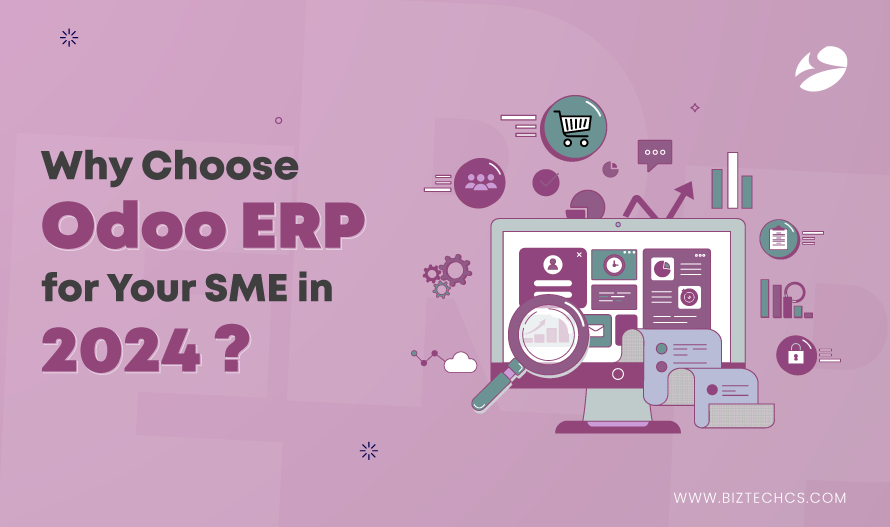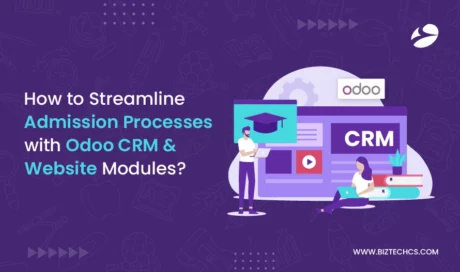What Makes Odoo ERP the Best Pick for SMEs in 2024?
15 Feb, 2024
7 min read
15 Feb, 2024
7 min read
Table of Content

In a world of rapid technological changes and evolving trends, small and medium-scale enterprises must strive tooth and nail for survival. Besides technology adoption and struggle with market penetration and expansion, they frequently compete with large companies and work with limited financial resources.
Evidently, SMEs have to work hard so they can overcome these challenges and make a profit out of their business. However, that seems difficult, considering their budget restrictions. The need for ERP becomes inevitable for such businesses as it results in more streamlined operations, improved productivity, and better sales strategies.
If you are a budding entrepreneur facing a similar situation, this blog is for you. Here, we will talk about Odoo – one of the best ERP software for small businesses and why SMEs prefer it.
So, without further ado, let’s jump right into it!
Small to medium-scale businesses face multiple business and operational challenges that they must overcome to survive and flourish. But, what are these challenges? Let’s take a deep dive into those aspects.
Odoo is a suite of business management software solutions like eCommerce, billing, accounting, manufacturing, inventory management, project management, enterprise resource planning, customer relationship management, etc.
Initially launched as an Open ERP system, it became a widely used ERP system because of its scalability, customizability, and extensibility. Odoo later released its Enterprise version to accommodate the needs of various business types and fund the operations of the Odoo Community.
It is also called a low-cost ERP system as the Community version license is available free of cost and you only have to spend to hire Odoo developers for implementation and migration purposes.
Odoo ERP system allows you to scale flexibly as per your needs. For instance, you can start with a few Odoo modules and later add more when your business grows. Besides the various modules, you also have access to the Odoo App Store where you get multiple free and premium Odoo applications. These apps can extend your system’s capabilities and streamline your business operations.
Now that we are familiar with the Odoo system basics, you may wonder why I should choose Odoo for my SME?
Yes, there are multiple ERP and CRM systems available in the market, some open-source and some proprietary. Why not those?
For starters, the Odoo platform is a single-stop solution with multiple capabilities that enable seamless collaboration between teams, project management, resource management, task management, and much more.
But that’s not all, there are multiple other reasons why SMEs prefer ERP Odoo.
With multiple benefits and features, Odoo appears to be the best ERP for small and medium enterprises. It has a seamless user interface, is easy to use, and provides greater flexibility. You can optimize your business operations a lot more seamlessly with a system like Odoo.
However, having the right partner for implementation is as crucial as choosing the Odoo ERP itself.
For the implementation of Odoo ERP, BiztechCS might be your best bet. With our 17+ years of experience across a myriad of industries, we have the skills and expertise to provide a unique solution for your SME. Being an Odoo partner, we constantly learn and update our knowledge of the Odoo business suite in order to provide you with the best solution. Whether you use Odoo ERP for service industry or any other, we can help you with implementation, migration, training, support, and maintenance.
Connect with our Odoo experts for any queries!
Odoo ERP stands out in 2024 as an exemplary choice for SMEs due to its comprehensive, flexible, and cost-effective solutions. Tailored to meet the unique demands of small and medium-sized enterprises, Odoo’s integrated approach streamlines business processes, enhancing efficiency and productivity. Its user-friendly interface, coupled with a wide array of customizable modules allows SMEs to adapt the system to their specific needs, fostering growth and scalability.
The automation capabilities of Odoo significantly reduce manual workload, thereby minimizing errors and increasing operational efficiency. Furthermore, its open-source nature and strong community support provide continuous improvements and a wealth of resources, ensuring that SMEs are equipped with a robust and future-proof tool.
Odoo
99
By Devik Gondaliya
02 Jul, 2025

Odoo
414
By Devik Gondaliya
25 Jun, 2025

Odoo
1035
By Devik Gondaliya
12 Jun, 2025